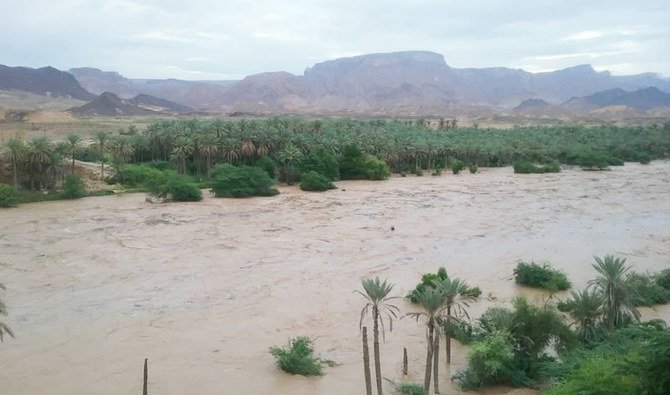
- ARAB NEWS
- 04 Jul 2025

Saeed Al-Batati
AL-MUKALLA: Thousands of people have been left homeless following torrential rain and flash flooding in Yemen.
For the second consecutive week, heavy rains triggered flash floods that washed away houses, farms, roads and electricity and water lines in the provinces of Marib, Dhale, Abyan, Hadramout, Ibb and Hajjah. The severe weather prevented medical workers battling the coronavirus pandemic from reaching health facilities, testing centers and patients.
Yemen’s President Abed Rabbo Mansour Hadi on Sunday instructed the governors of heavily affected provinces to send relief aid to those who had lost property during the downpours. He also appealed to local and international aid organizations to help the country cope with the effects of the flooding.
The government’s Executive Unit for IDPs Camp Management said that more than 2,600 families in Marib, Hajjah, Abyan and Dhale have been left without shelter after rains and floods washed away their tents and straw houses.
In its reports, seen by Arab News, the unit recommended distributing cash to the affected families, relocating them to safer areas and building stronger houses. In the central city of Marib that hosts hundreds of thousands of people who fled fighting in their home provinces, flash floods filled up the Marib dam reservoirs.
The unit said 1,340 families were affected after floods inundated their tents. The intensity of floods stoked fears about a possible dam rupture that could destroy hundreds of houses and farms.
To allay fears and quash rumors about the crumbling of the dam, Marib Gov. Sultan Al-Arada and several government officials visited the dam and assured the public that it was safe and could withstand even harsher floods.
The UN High Commissioner for Refugees (UNHCR) office in Yemen said flooding in the northern province of Hajjah and the western province of Hodeidah had washed away the homes and farms of thousands of families.
“Recent heavy rains and flooding across Hajjah and Hodeidah have impacted 9,000+ families,” it said. “Shelters, roads and land were destroyed. Loss of livestock and personal belongings. UNHCR quickly responded, helping thousands with emergency shelter and items like mattresses and blankets,” the UNHCR Yemen office tweeted on Sunday.
The National Meteorology Center has predicted more heavy rains and flash floods in many parts of Yemen throughout this week, warning people against crossing into water courses or driving in mountainous and hilly areas.
Health concerns
Local health officials said Monday that the downpours had hampered efforts to contain the spread of coronavirus across Yemen and created ripe conditions for the spread of mosquitoes.
Dr. Ishraq Al-Subaee, a spokesman for the Aden-based National Coronavirus Committee, told Arab News that many health facilities across government-controlled provinces could not send updates about coronavirus as floods prevented them from testing suspected cases or sending samples to testing centers.
Health workers in the southern province of Shabwa, which does not have a coronavirus testing center, could not send samples to neighboring Hadramout province due to floods and rains, he said.
The National Coronavirus Committee on Sunday reported four new cases and three deaths, bringing the total number of confirmed coronavirus infections to 1,734, including 497 fatalities and 862 recoveries. Yemen reported its first case of coronavirus on April 10 in Hadramout.
Local health officials in the city of Marib said that ambulances could still not reach heavily affected areas in the province due to the floods, as local health centers reported a surge in the number of mosquito-borne diseases.
“What concerns us most is a potential outbreak of malaria and dengue fever in Marib, mainly among displaced people,” Dr. Abdul Aziz Al-Shadadi, the director of Marib’s Ministry of Health office, told Arab News.